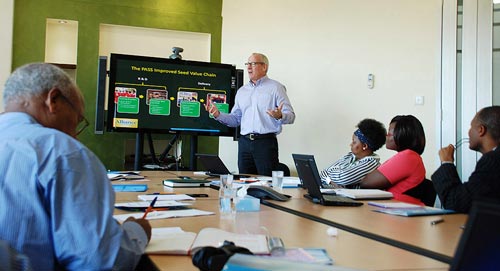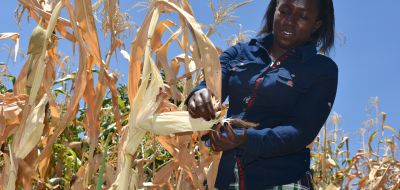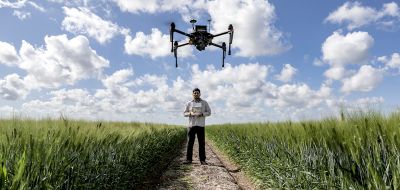Working group to enhance seed delivery to African farmers formed

By Florence Sipalla/CIMMYT

The Drought Tolerant Maize for Africa (DTMA) project and the Alliance for a Green Revolution in Africa (AGRA) Program for Africa’s Seed Systems (PASS) formed a working group this week to address challenges in commercializing improved seed to benefit smallholder farmers. The two initiatives – funded by the Bill & Melinda Gates Foundation – will combine efforts to ensure farmers have access to improved maize seed. PASS works with seed companies while DTMA partners with research institutes and seed companies to develop and deploy drought-tolerant maize seed. “We want to create synergies by combining efforts to reach more farmers,” said Tsedeke Abate, DTMA project leader.
Donors and research institutions invest in breeding improved seed to benefit farmers, which requires efforts by different members of the seed value chain. Research institutions, seed companies and other partners are needed to bridge the gap between researchers and farmers. This entails working with seed companies and agro-dealers to ensure they stock enough seed and have good distribution networks to reach farmers across the continent. The working group was formed during a meeting held at AGRA’s Nairobi offices on 28 October; scientists from the Tropical Legumes II project, led by the International Crops Research Institute for the Semi-Arid-Tropics (ICRISAT), also attended. The organizations have similarities regarding their work, programs and funding. “We want to learn more about this area and see how we can work together,” said Joseph DeVries, PASS director. “We have new varieties in our seed banks; we have to get them to farmers,” he added, explaining farmers will benefit from higher-yielding, insectand drought-resistant varieties.
Commercialization challenges discussed included production of breeder and foundation seed, seed quality, unsold seed stocks, effective branding and packaging of seed and inadequate promotion of new varieties by seed companies through demonstrations. “Breeding a great variety is no guarantee of farmer adoption,” said Regina Richardson, a PASS associate program officer in charge of commercialization. Participants said demonstrations effectively raise farmers’ awareness of new varieties but are expensive to host. “I’m proud to say that we have touched the lives of researchers and farmers,” Abate said. “We have released over 140 maize varieties that have a yield advantage of 20 to 30 percent over the farmers’ traditional varieties. Many of the products coming out of the DTMA breeding pipeline have been commercialized by our partners; mainly seed companies and community-based seed producers,” he added.
Abate called for an interdisciplinary and inter-institutional approach to policy. DeVries added that –in addition to seed– fertilizer and crop management play important roles in ensuring farmers benefit from improved seed. DTMA maize breeder Dan Makumbi highlighted the challenges seed companies face in seed production, such as inadequate irrigation facilities and lack of personnel to maintain the lines. Emmanuel Monyo, ICRISAT’s Tropical Legumes project leader, said ICRISAT benefitted from the existence of about 500 small seed companies during the deployment of improved seed to farmers in India. “Partnerships that have targets and interest changed the adoption of basic seed,” Monyo said. He also highlighted the role of “women’s groups that had been empowered to produce and market legume seed,” as a strategy that contributed to the successful deployment of seed. Partners agreed to continue sharing information by participating in each other’s meetings, sharing success stories and continuing to provide technical backstopping for seed companies and national programs.

